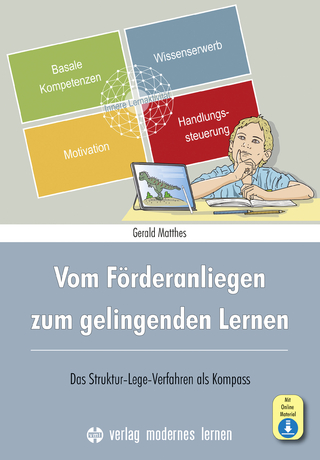
Handbook of Special Education
Routledge (Verlag)
978-1-138-69914-4 (ISBN)
- Titel ist leider vergriffen;
keine Neuauflage - Artikel merken
James M. Kauffman (Ed.D., University of Kansas) is Professor Emeritus of Education at the Curry School of Education at the University of Virginia, where he had been a faculty member of the Curry School of Education since 1970. He received the Research Award from the Council for Exceptional Children in 1994 and the Outstanding Leadership Award from the Council for Children with Behavioral Disorders (of which he is a past president) in 2002. He has served as editor of several journals in special education and been a member of several editorial boards. He is the author or co-author of many books, chapters, and articles in special education. Daniel P. Hallahan (Ph.D., University of Michigan) is Professor Emeritus of Education at the University of Virginia, where he had been a faculty member in the Curry School of Education since 1971. He was the inaugural editor of Exceptionality and has served on numerous editorial boards, including Learning Disabilities Research and Practice, Learning Disability Quarterly, The Journal of Special Education, and Exceptionality. He is a past president of the Division for Learning Disabilities of CEC and in 2000 received the CEC Career Research Award. He is the author or co-author of many books, chapters, and articles in special education. Paige Cullen Pullen (Ph.D., University of Florida) is Research Professor in the College of Education and Director of Research and Program Development—Early Childhood, Learning Disabilities, and Reading in the Lastinger Center at the University of Florida. She has been principal investigator on federally funded projects and has co-authored books, book chapters, and articles on evidence-based reading instruction. She is a frequent conference presenter, a fellow of the International Academy for Research on Learning Disabilities, and has received multiple teaching and mentoring awards. Her work has been not only with in-service teachers and pediatric residents in the US, but also in Zambia and Botswana. She is also the editor of Exceptionality and serves on the editorial board of other journals.
Foreword
Book and Section Editors
Preface
List of Contributors
Section I. Historical and Contemporary Issues in Educating Exceptional Learners
Section Editor, James M. Kauffman
Section Editor’s Introduction
Chapter 1. A History of Special Education
Michael M. Gerber
Chapter 2. Contemporary Issues
James M. Kauffman, C. Michael Nelson, Richard L. Simpson, & Devery Mock Ward
Chapter 3. Statistics, Data, and Special Educational Decisions: Basic Links to Realities
James M. Kauffman & John Wills Lloyd
Chapter 4. Special Education Teacher Preparation
Margo Mastropieri, Tom Scruggs, & Clara Hauth
Section II. Legal Aspects of Special Education
Section Editor, Mitchell L. Yell
Section Editor’s Introduction
Chapter 5. The Individuals with Disabilities Education Act: The Evolution of Special Education Law
Mitchell L. Yell, Antonis Katsiyannis, & M. Renee Bradley
Chapter 6. Free Appropriate Public Education
Mitchell L. Yell, Jean B. Crockett, James G. Shriner, & Michael Rozalski
Chapter 7. Individual Education Programs for Children with Disabilities
Barbara D. Bateman
Section III. Research Methods in Special Education
Section Editors, Thomas R. Kratochwill Paige Cullen Pullen
Section Editors’ Introduction
Chapter 8. Designing Rigorous Group Studies in Special Education: Standards and Quality Indicators for Contemporary Group Design Research
Russell Gersten, Madhavi Jayanthi, Lana Santoro & Rebecca Newman-Gonchar
Chapter 9. Designing Robust Single-Case Design Experimental Studies
Sharlene A. Kiuhara, Thomas R. Kratochwill, Paige Cullen Pullen
Chapter 10. Regression Discontinuity Design for Cross-sectional Data, Longitudinal Data and Intervention Research for Special Education
Ji Hoon Ryoo & Paige Cullen Pullen
Chapter 11. Meta-Analysis and Special Education
H. Lee Swanson & Amy C. Allen
Chapter 12. Research Synthesis and Meta-Analysis of Single-Case Designs
James E. Pustejovsky & John M. Ferron
Section IV. The General Education Context of Special Education
Section Editor, Naomi P. Zigmond
Section Editor’s Introduction
Chapter 13. Responsiveness to Intervention and Multi-Tiered Systems of Support for Reducing Reading Difficulties and Identifying Learning Disability
Rollanda E. O’Connor, Victoria Sanchez, & Joyce J. Kim
Chapter 14. Standards-Based Reform and Students with Disabilities
Rachel F. Quenemoen & Martha L. Thurlow
Chapter 15. Academic Progress Monitoring
Sheri Berkeley & Paul J. Riccomini
Chapter 16. Co-Teaching for Students with Disabilities: A Critical and Updated Analysis of the Empirical Literature
Sara Cothren Cook, Kimberly A. McDuffie-Landrum, Linda Oshita, & Bryan G. Cook
Chapter 17. General and Special Education Are (and Should Be) Different
Naomi Zigmond & Amanda Kloo
Section V. Special Education Categories
Section Editors, Paige Cullen Pullen & Daniel P. Hallahan
Section Editors’ Introduction
Chapter 18. Intellectual and Developmental Disabilities
Edward A. Polloway, Emily C. Bouck, James R. Patton, & Jacqueline Lubin
Chapter 19. Specific Learning Disabilities
Paige Cullen Pullen, Holly B. Lane, Kristen E. Ashworth, & Shelly P. Lovelace
Chapter 20. Attention-Deficit/Hyperactivity Disorder
Karen J. Rooney
Chapter 21. Emotional and Behavioral Disorders
Timothy J. Landrum
Chapter 22. Communication Disorders
Filip T. Loncke
Chapter 23. Deaf and Hard of Hearing Students
Gabriel I. Lomas, Jean F. Andrews, & Pamela C. Shaw
Chapter 24. Blind and Low Vision
Kim T. Zebehazy & Holly Lawson
Chapter 25. Traumatic Brain Injury
Renee Lajiness-O'Neill and Laszlo A. Erdodi
Chapter 26. Current Issues and Trends in the Education Children and Youth with Autism Spectrum Disorders
Janine P. Stichter, Maureen Conroy, Rose O’Donnell, & Brian Reichow
Chapter 27. Severe and Multiple Disabilities
Susan M. Bruce & Sarah E. Ivy
Chapter 28. Special Gifts and Talents
Jonathan A. Plucker & Carolyn M. Callahan
Section VI. Policy and Leadership in the Administration of Special Education
Section Editor, Jean B. Crockett
Section Editor’s Introduction
Chapter 29. High-Stakes Testing and Accommodations
Jennifer H. Lindstrom
Chapter 30. Conceptual Models for Leading and Administrating Special Education
Jean B. Crockett
Chapter 31. Fiscal Policy and Funding for Special Education
Thomas Parrish & Jenifer Harr-Robins
Chapter 32. Transforming Leadership in Special Education: Converging Policies, Professional Standards, and Scholarship
Mary Lynn Boscardin
Chapter 33. Improving Special Education Teacher Quality and Effectiveness
Bonnie S. Billingsley & Elizabeth Bettini
Section VII. Instructional Issues for Students with High-Incidence Disabilities
Section Editor, John Wills Lloyd
Section Editor’s Introduction
Chapter 34. Reading
Paige Cullen Pullen & Deanna B. Cash
Chapter 35. Writing and Students with Language and Learning Disabilities
Gary A. Troia, Steve Graham, & Karen R. Harris
Chapter 36. Intervention to Improve Arithmetic, Word-Problem, and Fraction Performance in Students with Mathematics Disabilities
Lynn S. Fuchs, Amelia M. Malone, Pamela M. Seethaler, Sarah R. Powell, & Douglas Fuchs
Chapter 37. Science and Social Studies
Thomas E. Scruggs, Margo A. Mastropieri, Frederick J. Brigham, & Lisa Marshak Milman
Chapter 38. Physical Education
Luke E. Kelly, Martin E. Block, & Andrew Colombo-Dougovito
Chapter 39. The Promise and Problem with Technology in Special Education: Implications for Academic Learning
Michael J. Kennedy & Joseph R. Boyle
Section VIII. Instructional Issues for Students with Low Incidence Disabilities
Section Editor, Stacy K. Dymond
Section Editor’s Introduction
Chapter 40. Educating Students with Significant Cognitive Disabilities: Historical Overview and Future Projections
Fred Spooner & Fredda Brown
Chapter 41. Systematic Instruction of Students with Significant Cognitive Disabilities
Erik Drasgow, Mark Wolery, Laura C. Chezan, James Halle, & Zahra Hajiaghamohseni
Chapter 42. Instructional Contexts
John McDonnell
Chapter 43. Access to General Education Curriculum for Students with Significant Cognitive Disabilities
Michael L. Wehmeyer & Karrie A. Shogren
Chapter 44. Functional Curriculum for Students with Significant Cognitive Disabilities
Stacy K. Dymond
Section IX. What It Will Mean to Transition
Section Editor, David Scanlon
Section Editor’s Introduction
Chapter 45. Transition to Postsecondary Education
Joseph W. Madaus, Manju Banerjee, Deborah Merchant, & Walter R. Keenan
Chapter 46. Career Decision-Making and Preparation, Transition, and Postsecondary Attainment of Work-bound Youth with High Incidence Disabilities
Jay W. Rojewski & Noel Gregg
Chapter 47. Transition to Daily Living for Persons with High Incidence Disabilities
David Scanlon, James R. Patton, & Marshall Raskind
Section X. Transition from School to Adulthood for Students with Low Incidence Disabilities
Section Editor, Katherine J. Inge
Section Editor’s Introduction
Chapter 48. Preparing Students with Low Incidence Disabilities to Work in the Community
Katherine J. Inge, Paul Wehman, & Hannah Seward
Chapter 49. Preparing Students with Low-Incidence Disabilities for Community Living Opportunities
Lauren E. Avellone & Joshua Taylor
Section XI. Parent and Family Issues in Special Education
Section Editor, George H. S. Singer
Section Editor’s Introduction
Chapter 50. Promoting Collaborative Partnerships with Families
Tracy Gershwin Mueller
Chapter 51. Resilience in Families of Children with Disabilities: Risk and Protective Factors
George H.S. Singer, Christine Maul, Mian Wang, & Brandy L. Ethridge
Chapter 52. Promoting Family Outcomes in Early Intervention
Melissa Raspa, Siobhan Colgan, Amanda Wylie, & Donald B. Bailey, Jr.
Section XII. Early Identification and Intervention in Exceptionality
Section Editor, Maureen A. Conroy
Section Editor’s Introduction
Chapter 53. Contemporary Early Intervention Models, Research and Practice
for Infants and Toddlers with Disabilities and Delays
Carl J. Dunst & Marilyn Espe-Sherwindt
Chapter 54. Early Intervention and Prevention of Disability: Preschoolers
Kathleen Marshall, William H. Brown, Maureen A. Conroy, & Herman Knopf
Chapter 55. Frameworks for Guiding Program Focus and Practices in Early Intervention
Patricia A. Snyder, Tara W. McLaughlin, & Crystal C. Bishop
Chapter 56. Early Identification and Intervention in Gifted Education: Developing Talent in Diverse Learners
Catherine M. Brighton & Jane M. Jarvis
Section XIII. Cultural and International Issues in Special Education
Section Editor, Dimitris Anastasiou
Section Editor’s Introduction
Chapter 57. Minority Disproportionate Representation in Special Education: Politics and Evidence, Issues and Implications
Dimitris Anastasiou, Paul L. Morgan, George Farkas, & Andrew L. Wiley
Chapter 58. Cross-national Differences in Special Education: A Typological Approach
Dimitris Anastasiou & Clayton Keller
| Erscheinungsdatum | 10.07.2017 |
|---|---|
| Zusatzinfo | 70 Tables, black and white; 46 Line drawings, black and white |
| Verlagsort | London |
| Sprache | englisch |
| Maße | 210 x 280 mm |
| Gewicht | 2540 g |
| Themenwelt | Sozialwissenschaften ► Pädagogik ► Sonder-, Heil- und Förderpädagogik |
| ISBN-10 | 1-138-69914-4 / 1138699144 |
| ISBN-13 | 978-1-138-69914-4 / 9781138699144 |
| Zustand | Neuware |
| Informationen gemäß Produktsicherheitsverordnung (GPSR) | |
| Haben Sie eine Frage zum Produkt? |
aus dem Bereich


